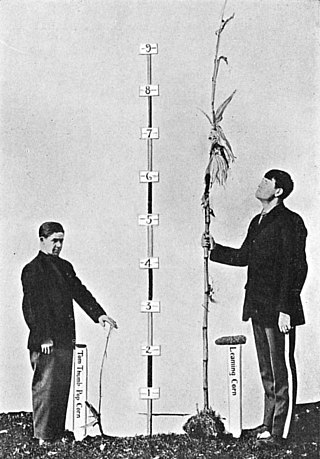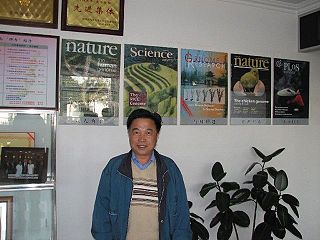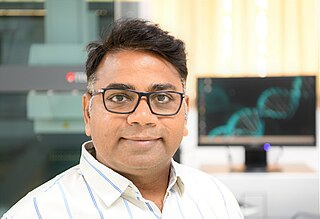Related Research Articles

Heritability is a statistic used in the fields of breeding and genetics that estimates the degree of variation in a phenotypic trait in a population that is due to genetic variation between individuals in that population. The concept of heritability can be expressed in the form of the following question: "What is the proportion of the variation in a given trait within a population that is not explained by the environment or random chance?"

Yang Huanming, also known as Henry Yang, is a Chinese biologist, businessman and one of China's leading genetics researchers. He is Chairman and co-founder of the Beijing Genomics Institute, formerly of the Chinese Academy of Sciences. He was elected as member of the Chinese Academy of Sciences in 2007, a foreign academician of Indian National Science Academy in 2009, a member of the German National Academy of Sciences in 2012, and foreign associate of the US National Academy of Science in 2014.
Genetic architecture is the underlying genetic basis of a phenotypic trait and its variational properties. Phenotypic variation for quantitative traits is, at the most basic level, the result of the segregation of alleles at quantitative trait loci (QTL). Environmental factors and other external influences can also play a role in phenotypic variation. Genetic architecture is a broad term that can be described for any given individual based on information regarding gene and allele number, the distribution of allelic and mutational effects, and patterns of pleiotropy, dominance, and epistasis.
William George Hill was an English geneticist and statistician. He was a professor at University of Edinburgh. He is credited as co-discoverer of the Hill–Robertson effect with his doctoral advisor, Alan Robertson.
Trudy Frances Charlene Mackay is the director of Clemson University's Center for Human Genetics located on the campus of the Greenwood (S.C.) Genetic Center. She is recognized as one of the world's leading authorities on the genetics of complex traits. Mackay is also the Self Family Chair in Human Genetics and Professor of Genetics and Biochemistry at Clemson University.
In multivariate quantitative genetics, a genetic correlation is the proportion of variance that two traits share due to genetic causes, the correlation between the genetic influences on a trait and the genetic influences on a different trait estimating the degree of pleiotropy or causal overlap. A genetic correlation of 0 implies that the genetic effects on one trait are independent of the other, while a correlation of 1 implies that all of the genetic influences on the two traits are identical. The bivariate genetic correlation can be generalized to inferring genetic latent variable factors across > 2 traits using factor analysis. Genetic correlation models were introduced into behavioral genetics in the 1970s–1980s.

Behavioural genetics, also referred to as behaviour genetics, is a field of scientific research that uses genetic methods to investigate the nature and origins of individual differences in behaviour. While the name "behavioural genetics" connotes a focus on genetic influences, the field broadly investigates the extent to which genetic and environmental factors influence individual differences, and the development of research designs that can remove the confounding of genes and environment. Behavioural genetics was founded as a scientific discipline by Francis Galton in the late 19th century, only to be discredited through association with eugenics movements before and during World War II. In the latter half of the 20th century, the field saw renewed prominence with research on inheritance of behaviour and mental illness in humans, as well as research on genetically informative model organisms through selective breeding and crosses. In the late 20th and early 21st centuries, technological advances in molecular genetics made it possible to measure and modify the genome directly. This led to major advances in model organism research and in human studies, leading to new scientific discoveries.

Rajeev Kumar Varshney is an Indian agricultural scientist, specializing in genomics, genetics, molecular breeding and capacity building in developing countries. Varshney is currently serving as Director, Western Australian State Agricultural Biotechnology Center; Director, Centre for Crop & Food Innovation; and International Chair in Agriculture & Food Security with the Food Futures Institute at Murdoch University, Australia since Feb 2022. Before joining Murdoch University, Australia he served International Crops Research Institute for the Semi-Arid Tropics (ICRISAT), a global agriculture R&D institute, for more than 16 years in different scientific and research leadership roles including Research Program Director for three global research programs– Grain Legumes, Genetic Gains and Accelerated Crop Improvement Program. He has the onus of establishing and nurturing the Center of Excellence in Genomics & Systems Biology (CEGSB), a globally recognized center for genomics research at ICRISAT that made impacts on improving agriculture and development of human resources in several countries including India, China, Kenya, Ethiopia, Tanzania, Nigeria, Ghana, Mali, Senegal, Burkina Faso, etc. Varshney holds Adjunct/Honorary/Visiting Professor positions at 10 academic institutions in Australia, China, Ghana, Hong Kong and India, including The University of Western Australia, University of Queensland, West Africa Centre for Crop Improvement, University of Hyderabad, Chaudhary Charan Singh University and Professor Jayashankar Telangana State Agricultural University.
The missing heritability problem is the fact that single genetic variations cannot account for much of the heritability of diseases, behaviors, and other phenotypes. This is a problem that has significant implications for medicine, since a person's susceptibility to disease may depend more on the combined effect of all the genes in the background than on the disease genes in the foreground, or the role of genes may have been severely overestimated.

Peter D. Keightley FRS is Professor of Evolutionary Genetics at the Institute of Evolutionary Biology in School of Biological Sciences at the University of Edinburgh.

Jennifer Lea Stow is deputy director (research), NHMRC Principal Research Fellow and head of the Protein Trafficking and Inflammation laboratory at the Institute for Molecular Bioscience (IMB), The University of Queensland, Australia. She was awarded her PhD from Monash University in Melbourne in 1982. As a Fogarty International Fellow, she completed postdoctoral training at Yale University School of Medicine (US) in the Department of Cell Biology. She was then appointed to her first faculty position as an assistant professor at Harvard University in the Renal Unit, Departments of Medicine and Pathology at the Massachusetts General Hospital in Boston. At the end of 1994 she returned to Australia as a Wellcome Trust Senior International Medical Research fellow at The University of Queensland where her work has continued. Stow sits on national and international peer review and scientific committees and advisory boards. She has served as head of IMB's Division of Molecular Cell Biology, and in 2008 she was appointed as deputy director (research).

Michael Edward "Mike" Goddard is a professorial fellow in animal genetics at the University of Melbourne, Australia.

Wendy Anne Bickmore is a British genome biologist known for her research on the organisation of genomic material in cells.
Eleftheria Zeggini is a director of the institute of translational genomics in Helmholtz Zentrum München and a professor at the Technical University of Munich (TUM). Previously she served as a research group leader at the Wellcome Trust Sanger Institute from 2008 to 2018 and an honorary professor in the department of health sciences at the University of Leicester in the UK.

In genetics, a polygenic score (PGS), also called a polygenic index (PGI), polygenic risk score (PRS), genetic risk score, or genome-wide score, is a number that summarizes the estimated effect of many genetic variants on an individual's phenotype, typically calculated as a weighted sum of trait-associated alleles. It reflects an individual's estimated genetic predisposition for a given trait and can be used as a predictor for that trait. In other words, it gives an estimate of how likely an individual is to have a given trait only based on genetics, without taking environmental factors into account. Polygenic scores are widely used in animal breeding and plant breeding due to their efficacy in improving livestock breeding and crops. In humans, polygenic scores are typically generated from genome-wide association study (GWAS) data.

Edward Charles Holmes is a British evolutionary biologist and virologist. Since 2012, he has been a fellow of the National Health and Medical Research Council (NHMRC) in Australia and professor at the University of Sydney. He was an honorary visiting professor at Fudan University in Shanghai, China, from 2019-2021.

Melissa Helen Little is an Australian scientist and academic, currently Theme Director of Cell Biology, heading up the Kidney Regeneration laboratory at the Murdoch Children's Research Institute. She is also a Professor in the Faculty of Medicine, Dentistry and Health Sciences, University of Melbourne, and Program Leader of Stem Cells Australia. In January 2022, she became CEO of the Novo Nordisk Foundation Center for Stem Cell Medicine reNEW, an international stem cell research center based at University of Copenhagen, and a collaboration between the University of Copenhagen, Denmark, Murdoch Children’s Research Institute, Australia, and Leiden University Medical Center, The Netherlands.

Peter Martin Visscher is a Dutch-born Australian geneticist who is professor and chair of Quantitative Genetics at the University of Queensland. He is also a professorial research fellow at the University of Queensland's Institute for Molecular Bioscience and an affiliate professor at their Queensland Brain Institute.
Peter Anthony Koopman is an Australian biologist best known for his role in the discovery and study of the mammalian Y-chromosomal sex-determining gene, Sry.
The infinitesimal model, also known as the polygenic model, is a widely used statistical model in quantitative genetics and in genome-wide association studies. Originally developed in 1918 by Ronald Fisher, it is based on the idea that variation in a quantitative trait is influenced by an infinitely large number of genes, each of which makes an infinitely small (infinitesimal) contribution to the phenotype, as well as by environmental factors. In "The Correlation between Relatives on the Supposition of Mendelian Inheritance", the original 1918 paper introducing the model, Fisher showed that if a trait is polygenic, "then the random sampling of alleles at each gene produces a continuous, normally distributed phenotype in the population". However, the model does not necessarily imply that the trait must be normally distributed, only that its genetic component will be so around the average of that of the individual's parents. The model served to reconcile Mendelian genetics with the continuous distribution of quantitative traits documented by Francis Galton.
References
- ↑ "Naomi Wray". Program in Complex Trait Genomics. Retrieved 24 August 2018.
- ↑ "Academy elects 28 new Fellows". AAHMS - Australian Academy of Health and Medical Sciences. 14 October 2020. Retrieved 7 December 2020.
- ↑ "ORCID". orcid.org. Retrieved 19 December 2021.
- ↑ Wray, Naomi Ruth (1986). Analysis of gestation lengths in American Simmental cattle (Thesis). OCLC 63341482.
- ↑ Wray, Naomi Ruth (1989). Consequences of selection in finite populations with particular reference to closed nucleus herds of pigs. University of Edinburgh. OCLC 556698761.
- ↑ "Professor Naomi Wray". Queensland Brain Institute. 19 August 2018. Retrieved 19 August 2018.
- ↑ "Professor Naomi Ruth Wray". Australian Academy of Science. Retrieved 19 August 2018.